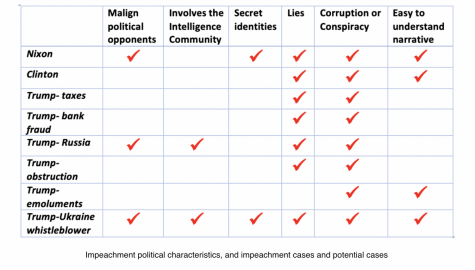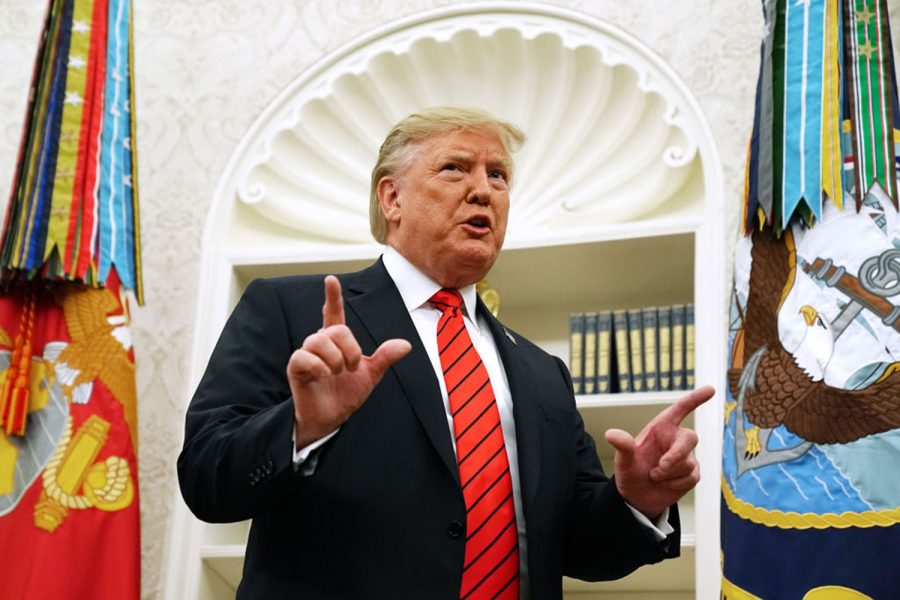The impeachment inquiry: how professors approach a historical, yet political current event in the classroom
With uncharted territory being broached in the Trump administration, university professors weigh in on how they address politically charged topics in the classroom.
U.S. President Donald Trump gives pauses to answer a reporters’s question about a whistleblower as he leaves the Oval Office after hosting the ceremonial swearing in of Labor Secretary Eugene Scalia at the White House September 30, 2019 in Washington, DC. (Chip Somodevilla/Getty Images/TNS)
Since U.S. House Speaker Nancy Pelosi announced the opening of an impeachment inquiry into President Trump Sept. 24, Sam Glaser has been rewriting his “U.S. Congress” class syllabus every morning to fit in the latest news about the impeachment inquiry.
“[Sept. 25] I said, ‘OK, well, we’re going to talk about party leadership. The speaker of the House just opened an impeachment inquiry. How can I use this to say something interesting about leadership in Congress?’ ” said Glaser, a University of Iowa professor of American Politics.
The inquiry is the beginning of the first impeachment process that most undergraduate students will be able to remember. The last time the House moved to impeach a president was Bill Clinton in 1998.
Professors and students are navigating the latest news about the impeachment inquiry in class lectures and discussions, the process of which can be convoluted and political. What constitutes an impeachable offense is left up to the interpretation of the party in power of each chamber of Congress.
“If you ask 100 different people, you’ll get 100 different answers,” UI Law Professor Andy Grewal said said of the grounds for impeachment. He referenced former President Gerald Ford while he was in Congress defining an impeachable offense as “whatever a majority of the House of Representatives” thinks it should be.
Although Grewal said the impeachment inquiry wasn’t relevant to his current law class about tax law, he did teach a seminar in the spring about law and the Trump presidency looking at legal disputes surrounding the administration, such as whether the president could use emergency powers to divert funds and build a wall along the U.S.-Mexico border.
Jennifer N. Victor, an associate professor of political science at George Mason University, came up with six characteristics that elevate the political status of an impeachment inquiry. Victor applies the characteristics to the presidencies of Richard Nixon, Clinton, and Trump, including six potential Trump scandals.

At issue in the current impeachment inquiry is the president’s July phone call with the president of Ukraine, where Trump congratulated him on his election to office and asked him to investigate unsubstantiated corruption claims against Democratic presidential hopeful Joe Biden and his son, Hunter, among other election security claims. In the days before the call, President Trump froze $391 million of aid money intended for Ukraine.
Explaining the background of the impeachment inquiry is key to Glaser’s class on Congress, Glaser said.
He said he’s thought a lot about how to approach a topic such as impeachment with a nonpartisan lense in the classroom, but he said it’s just as important not to be overly cautious when giving students objectively factual information.
“This is a tremendous, whatever else it is, this is a tremendous opportunity for me to show my students that political science informs current events,” Glaser said.
One part of the inquiry Grewal said is important to stress is that it’s not a full-blown impeachment investigation. Lawmakers are investigating whether they have the evidence to impeach.
“You turn on the news, you don’t see legislators debating, ‘Should we impeach or not?’ They’re not at that stage yet,” Grewal said.
UI American politics Professor Caroline Tolbert said with this impeachment inquiry, she wants to emphasize in her classes that election security is the core issue. In the edited transcript of the phone call between Trump and the Ukranian president, Trump urged Ukraine to investigate CrowdStrike — a cybersecurity firm that worked closely with the Democratic National Committee during Robert Mueller’s investigation into Russian election hacking.
“I think this really does affect free and fair elections … like with Ukraine trying to interfere in terms of [former Vice President Joe] Biden, who’s currently running for office,” Tolbert said.
Tolbert said that conversations in her classes have become more emotionally charged since Trump took office in 2016. She pointed to the travel ban the Trump administration imposed on predominately Muslim countries.
“We’ve been in this really intense era of party polarization,” she said. “Almost every issue is highly, highly volatile. I think everyone is using care.”



